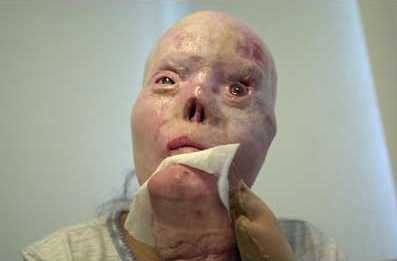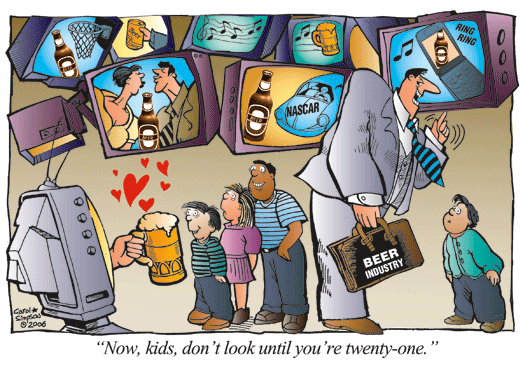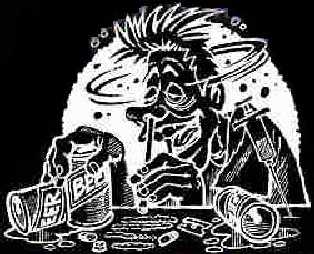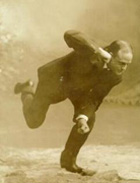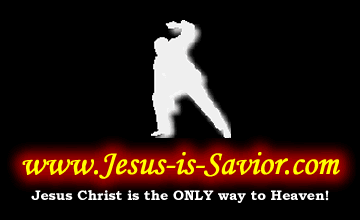"And he said, What hast thou done? the voice of thy brother's blood crieth unto me from the ground." -Genesis 4:10
 Today
marks the 75th year since PROHIBITION ended. Don't
believe the lying propaganda that prohibition was a bad idea... ALCOHOL
PROHIBITION was good! Prohibition was the right thing to do!
Prohibition failed because of the sinfulness of the American people and
because many authorities refused to enforce the law. Then, just as
today, people break the law because they know the penalties are minor. God says give the death penalty to every drunk driver who kills someone
(Exodus 21:24).
Today
marks the 75th year since PROHIBITION ended. Don't
believe the lying propaganda that prohibition was a bad idea... ALCOHOL
PROHIBITION was good! Prohibition was the right thing to do!
Prohibition failed because of the sinfulness of the American people and
because many authorities refused to enforce the law. Then, just as
today, people break the law because they know the penalties are minor. God says give the death penalty to every drunk driver who kills someone
(Exodus 21:24).
Did Evangelist Billy Sunday waste the best years of his life fighting the booze industry? No, God instructs all Christians to "RISE UP FOR ME AGAINST THE EVILDOERS" (Psalm 94:16). Billy Sunday did what every Christian today should be doing... speaking out against the evils of booze! (Ephesians 5:11). Was the Anti-Saloon League wrong in their efforts to outlaw booze? No, they were fighting against a menace to society, which alcohol still is today.
It is not surprising that many Americans today are singing praises over the failure of PROHIBITION, when you consider that 71% of Americans in 2006 confessed to drinking alcohol...
American Drinking Habits
The poll, conducted July 6-9 among a national sample of 1,007 people aged 18 and older, showed 64% of Americans say they drink alcoholic beverages.
Researchers say the percentage of Americans who say they drink has changed little over time, averaging about 63% since Gallup began surveying Americans about drinking habits in 1939.
However, the most recent poll shows the frequency of drinking has risen over the last 10 years. The 2006 poll showed 71% of American drinkers said they had an alcoholic drink in the last week, which is significantly higher than the 54% who said the same in 1996.
Also on the rise is the number of drinks Americans are drinking. The poll shows those who drink alcohol report drinking an average of 4.5 drinks per week, compared with 2.8 in 1996.
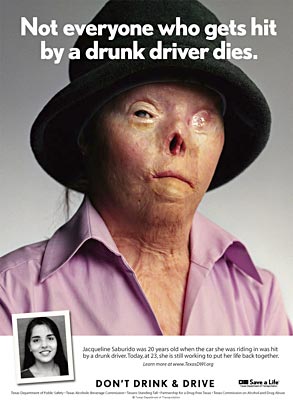 America
is a sinfully proud nation that snubs its nose at God and glorifies sin.
How dare we claim "In God We Trust," while flocking by the millions to
SIN CITY Las Vegas? How dare we claim "One nation Under God,"
while we murder little defenseless babies by abortion, cracking open their
skulls and sucking
out their brains. Woe unto America!
America
is a sinfully proud nation that snubs its nose at God and glorifies sin.
How dare we claim "In God We Trust," while flocking by the millions to
SIN CITY Las Vegas? How dare we claim "One nation Under God,"
while we murder little defenseless babies by abortion, cracking open their
skulls and sucking
out their brains. Woe unto America!
The reason why prohibition failed wasn't because PROHIBITION was a bad thing; BUT, because America has turned its back on God.
It wasn't the churches and Christian bookstores selling booze during prohibition, it was the dirty and vile saloons. Every form of sin and debauchery is associated with the evils of booze and the saloon. Booze and immorality are synonymous.
Thank God for those folks who fought to make prohibition a reality, and woe unto the Devil's crowd who fought to repeal it.
God will be vindicated on Judgment Day.
Just as Abel's blood cried out from the ground to God (Genesis 4:10), so do all the victims of the alcohol industry cry out to God.
The following article attempts to justify the repeal of alcohol prohibition laws. Although the arguments are valid, and prohibition certainly didn't work, these facts are irrelevant to the woes associated with alcoholic beverages then and now.
The author of the following article bases her thesis on situation ethics, instead of upon God's Word. Many people today believe abortion is good because it controls overpopulation; but the Bible calls it murder (Exodus 20:13). Alcohol is of the Devil, and those who've had their lives destroyed and loved ones taken by it would agree.
Prohibition in the 1920s
Thirteen Years That Damaged America
I have always taken an interest in the Roaring Twenties and that is why I decided to write my English term paper on an event that occurred in the 1920s. What follows is my term paper which concentrates on prohibition and why it was not effective, namely because of lack of enforcement, growth of crime, and the increase in the drinking rate. I hope this may be of some help to you.
“Prohibition did not achieve its goals. Instead, it added to the problems it was intended to solve” (Thorton, 15). On Midnight of January 16, 1920, one of the personal habits and customs of most Americans suddenly came to a halt. The Eighteenth Amendment was put into effect and all importing, exporting, transporting, selling, and manufacturing of intoxicating liquor was put to an end.
Shortly following the enactment of the Eighteenth Amendment, the National Prohibition Act, or the Volstead Act, as it was called because of its author, Andrew J. Volstead, was put into effect. This determined intoxicating liquor as anything having an alcoholic content of anything more than 0.5 percent, omitting alcohol used for medicinal and sacramental purposes. This act also set up guidelines for enforcement (Bowen, 154).
Prohibition was meant to reduce the consumption of alcohol, seen by some as the devil’s advocate, and thereby reduce crime, poverty, death rates, and improve the economy and the quality of life. “National prohibition of alcohol -- the ‘noble experiment’ -- was undertaken to reduce crime and corruption, solve social problems, reduce the tax burden created by prisons and poorhouses, and improve health and hygiene in America” (Thorton, 1). This, however, was undoubtedly to no avail. The Prohibition amendment of the 1920s was ineffective because it was unenforceable, it caused the explosive growth of crime, and it increased the amount of alcohol consumption.
“It is impossible to tell whether prohibition is a good thing or a bad thing. It has never been enforced in this country” (LaGuardia). After the Volstead Act was put into place to determine specific laws and methods of enforcement, the Federal Prohibition Bureau was formulated in order to see that the Volstead Act was enforced. Nevertheless, these laws were flagrantly violated by bootleggers and commoners alike.
Bootleggers smuggled liquor from oversees and Canada, stole it from government warehouses, and produced their own. Many people hid their liquor in hip flasks, false books, hollow canes, and anything else they could find (Bowen, 159). There were also illegal speak-easies which replaced saloons after the start of prohibition. By 1925, there were over 100,000 speak-easies in New York City alone (Bowen, 160).
As good as the ideal sounded, “...prohibition was far easier to proclaim than to enforce” (Wenburn, 234). With only 1,550 federal agents and over 18,700 miles of (Bowen, 166) “vast and virtually unpoliceable coastline” (Wenburn, 234), “it was clearly impossible to prevent immense quantities of liquor from entering the country” (Behr, 162). Barely five percent of smuggled liquor was hindered from coming into the country in the 1920s.
Furthermore, the illegal liquor business fell under the control of organized gangs, which overpowered most of the authorities (Wenburn, 234). Many bootleggers secured their business by bribing the authorities, namely federal agents and persons of high political status (Bowen, 160). “No one who is intellectually honest will deny that there has not yet been effective nationwide enforcement” (Behr, 161).
As a result of the lack of enforcement of the Prohibition Act and the creation of an illegal industry an increase in crime transpired. The Prohibitionists hoped that the Volstead Act would decrease drunkenness in America and thereby decrease the crime rate, especially in large cities. Although towards the beginning of Prohibition this purpose seemed to be fulfilled, the crime rate soon skyrocketed to nearly twice that of the pre-prohibition period. In large cities the homicide went from 5.6 (per 100,000 population) in the pre-prohibition period, to nearly 10 (per 100,000 population) during prohibition, nearly a 78 percent increase.
Serious crimes, such as homicides, assault, and battery, increased nearly 13 percent, while other crimes involving victims increased 9 percent. Many supporters of prohibition argued that the crime rate decreased. This is true if one is examining only minor crimes, such as swearing, mischief, and vagrancy, which did in fact decrease due to prohibition. The major crimes, however, such as homicides, and burglaries, increased 24 percent between 1920 and 1921. In addition, the number of federal convicts over the course of the prohibition period increased 561 percent. The crime rate increased because “prohibition destroyed legal jobs, created black-market violence, diverted resources from enforcement of other laws, and increased prices people had to pay for prohibited goods” (Thorton, 10).
The contributing factor to the sudden increase of felonies was the organization of crime, especially in large cities. Because liquor was no longer legally available, the public turned to gangsters who readily took on the bootlegging industry and supplied them with liquor. On account of the industry being so profitable, more gangsters became involved in the money-making business. Crime became so organized because “criminal groups organize around the steady source of income provided by laws against victimless crimes such as consuming alcohol” (Thorton, 13). As a result of the money involved in the bootlegging industry, there was much rival between gangs. The profit motive caused over four hundred gang related murders a year in Chicago alone (Bowen, 175).
Incidentally, large cities were the main location for organized gangs. Although there were over a half dozen powerful gangs in New York, Chicago was the capital of racketeers, including Johnny Torrio, “Bugs Moran”, the Gennas, and the O’Banions (Behr, 192). The most powerful and infamous bootlegger however, was Al Capone, operating out of Chicago. One of the most gruesome and remembered gangster shoot-outs of all time occurred on Valentine’s Day, 1929. Because of business differences, Capone had his henchman, “Machine Gun” Jack McGurn plot the murder of the O’Banions, led by Bugs Moran.
McGurn staged a delivery of alcohol to Moran at a warehouse and had his gang members impersonate police officers and pretend to raid the transaction. With a sweep of machine gun fire, McGurn killed all that were inside. Capone had a solid alibi, being in Miami at the time, and no convictions were ever made. This event is an example of how prohibition fueled gang warfare and increased the crime rate in America (Bowen, 175).
“Seldom has law been more flagrantly violated. Not only did Americans continue to manufacture, barter, and possess alcohol; they drank more of it” (Bowen, 154). The Americans that supported the law of prohibition argued that if drinking was not allowed, then Americans would drink less. Although the consumption of alcohol fell immediately after the beginning of prohibition, there was a subsequent increase after less than a year (see appendix i). After the start of prohibition, because manufacturing and importing alcohol were illegal, people needed to find ways to avoid being caught.
Because beer had to be transported in large quantities, which became difficult, the price of beer went up and thus Americans began to drink less of it. Instead, they began to drink more hard liquor, which was more concentrated and easier to transport and thus less expensive. Because of prohibition, Americans began to drink more potent drinks and so became more drunk by drinking less. Another downfall of prohibition was that the illegally made products had no standards. Deaths from poisoned liquor rose from 1,064 in 1920 to 4,154 in 1925.
Although one would think that prohibition would enhance the difficulty of obtaining alcohol, liquor was actually very easy to acquire. The bootlegging business was so immense that customers could easily obtain alcohol by simply walking down almost any street. Replacing saloons, which were all shut down at the start of prohibition, were illegal speak-easies. These businesses, hidden in basements, office buildings, and anywhere that could be found, admitted only those with membership cards, and had the most modern alarm systems to avoid being shut down. “There were twice as many speak-easies in Rochester, New York, as saloons closed by Prohibition” (Thorton, 6).
Bootleggers, having very profitable businesses (one bootlegger was worth more than five million dollars), either illegally imported liquor, stole it from government warehouses, or made their own, making it readily available to customers (Bowen 170). Many home products were sold to those customers who wanted small quantities of alcohol. Vine-Glo, a type of grape juice, turned into wine (15 percent alcohol) after sixty days of fermentation. Wort, or near beer, was legally produced because it had less than 0.5 percent alcohol. When added to yeast, this product quickly turned into beer. Alcohol used for medicinal purposes, prescribed by a doctor, was also technically legal.
There were restrictions, such as only one pint was allowed per person in a ten day period, but these rules were blatantly ignored (Bowen, 164). The sales of medicinal alcohol, which was 95 percent pure alcohol, increased 400 percent between 1923 and 1931. Another factor that proves the increase of alcohol consumption is the increase in deaths and drunkenness. The drop in alcohol related deaths before prohibition quickly rose during prohibition. Arrests for drunkenness and disorderly conduct increased 41 percent, while arrests for drunk driving increased 81 percent during prohibition (Thorton, 7).
“The results of the experiment [prohibition] are clear: ...organized crime grew into an empire; ...disrespect for the law grew; and the per capita consumption of the prohibited substance -- alcohol -- increased dramatically” (McWilliams). It is obvious that this “noble experiment” was not so noble but rather a miserable failure on all accounts. Reasonable measures were not taken to enforce the laws and so they were practically ignored.
People flagrantly violated the law, drinking more of the substance that was originally prohibited. The problems prohibition intended to solve, such as crime, grew worse and they never returned to their pre-prohibition levels. Not only was prohibition ineffective, it was also damaging to the people and society it was meant to help. Prohibition should not have gone on for the thirteen years it was allowed to damage society.
Written by: Catherine H. Poholek
May 6, 1998
Works Cited
1. Behr, Edward.
Prohibition: Thirteen Years That Changed America. New York: Arcade
Publishing, 1996.
2. Bowen, Ezra, ed. This Fabulous Century. 6 vols. New York: Time Life
Books, 1969.
3. LaGuardia, Fiorella H. “American Prohibition in the 1920s.” 1926.
Online. Netscape. 23 April 1998.
4. McWilliams, Peter. “Prohibition: A Lesson in the Futility (and
Danger) of Prohibiting.” Online. Netscape. 23 April 1998.
5. Thorton, Mark. “Policy Analysis: Alcohol Prohibition Was a Failure.”
July 17, 1991. Online. Netscape. 23 April 1998.
6. Wenburn, Neil. The USA: A Chronicle of Pictures. New York: Smithmark
Publishers Inc., 1991.
© 1998 k2groovy@aol.com
SOURCE: http://www.geocities.com/Athens/troy/4399
The author of the preceding article is correct to say that one of the reasons PROHIBITION utterly failed was because authorities failed to enforce the law. Things are no different today. America's 40,000 gun laws have been a complete failure. Yet, every time a child is shot, someone wants to pass another gun law. The problem in the United States today is not a lack of laws; but rather, a lack of enforcement of existing laws. Please read, The Hypocrisy of American Society.
"Righteousness exalteth a nation: but sin is a reproach to any people." ~Proverb 14:34
Here's the truth why the PROHIBITION LAW was passed, and why it was later repealed...
"Alcohol and bribery always go together (Isaiah 5:23-23). The pious hypocrite Rockefeller was a member of the Anti-Saloon League and actually donated money to the prohibition cause ($350,000 worth!). He HATED the booze business because he did not control it!
When prohibition was enacted in 1920, he bought up all the distilleries and wineries at a pittance. Then when prohibition was repealed by Rockefeller stooge Roosevelt in 1933, the booze money began to flow into the Rockefeller coffers. That is why the Rockefeller owned newspapers are constantly telling people that alcohol is GOOD for you. They know that you will soon be visiting the Rockefeller controlled "doctors" and be using Rockefeller "drugs" to cure you. That is why "doctors" in the U.S. are not trying to stop the alcohol/poison business which is the main cause of illness and death in the country." -SOURCE
The Rockefeller family also bought up the Medical industry. What an evil family! Please read, In Your Face America!
"God Almighty never intended that the Devil should triumph over the Church. He never intended that the saloons should walk rough-shod over Christianity. And if you think that anybody is going to frighten me, you don't know me yet." —Billy Sunday, The Need for Revivals
Conclusion
PROHIBITION was a good thing. Just because it didn't work doesn't mean that it was a bad idea. I sincerely don't believe alcohol would ever have been outlawed in the first place, if it weren't for the greedy Rockefeller's who wanted to buy out the industry. American's love their sins too much, which was evidenced clearly in the Roaring Twenties. The situation in America today is much, much worse. Who would have imagined a day in America when homosexuals would be given in unholy matrimony.
It's vile homosexual God-haters like Rosie O'Donnell who are labeling Christians as terrorists. Rosie O'Donnell is the enemy of God. Philippians 3:18-19, "For many walk, of whom I have told you often, and now tell you even weeping, that they are the enemies of the cross of Christ: Whose end is destruction, whose God is their belly, and whose glory is in their shame, who mind earthly things." Consider yourself warned.
Billy Sunday was 100% correct when he mightily preached...
"The saloon is the sum of all villainies. It is worse than war or pestilence. It is the crime of crimes. It is the parent of crimes and the mother of sins. It is the appalling source of misery and crime in the land. And to license such an incarnate fiend of hell is the dirtiest, low-down, damnable business on top of this old earth."
Oh, how true still today are the words of God's man, Billy Sunday! People don't seem to care about the woeful problem of alcohol in America, until it's their own precious child's blood gushing out, in a mess of broken bones and mangled flesh beneath the 2-ton vehicle of a drunken fool. Then you want the death penalty. Then you want prohibition to come back. But, it's too late. We are living in a very selfish nation, where the beer-barons and beer-drinkers don't care if your child gets run over by an alcohol-impaired driver. They will burn in Hell. Isaiah 5:14, "Therefore hell hath enlarged herself, and opened her mouth without measure: and their glory, and their multitude, and their pomp, and he that rejoiceth, shall descend into it." Beer is of the Devil.
Prohibition was good, right, and respectable; but a nation of godless heathens refused to DO RIGHT, and the powers that be failed to enforce the law. Thus, evil won out in America! It was the reprobate Frank Sinatra, in his song CHICAGO, who mocked God's man by singing...
“The town Billy Sunday
couldn’t shut down.”
—Frank Sinatra; from the song, Chicago
But Billy Sunday tried, amen! Frank Sinatra is burning in Hellfire today; BUT, Billy Sunday is walking streets of gold in Heaven. I would infinitely rather be a poor man with the Lord Jesus as my Savior, than to enjoy the splendors of this life for a short time, only to spend an eternity in Hell without Christ.

